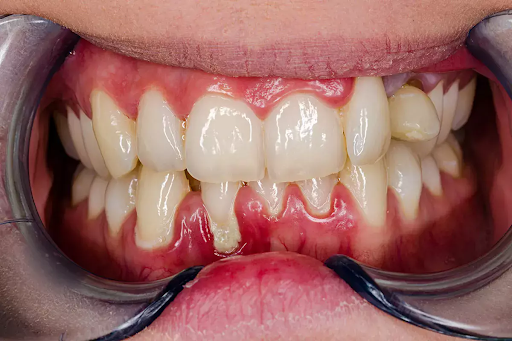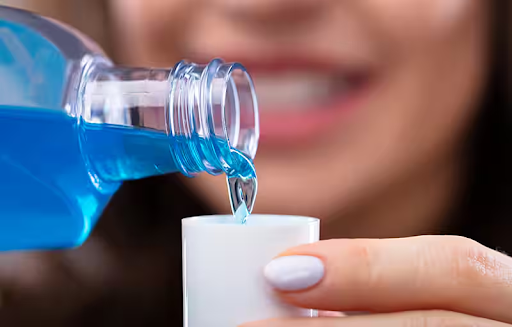Gingivitis is a common yet often overlooked dental condition that can lead to more serious oral health problems if left untreated. Characterized by inflammation of the gums—often accompanied by redness, swelling, and bleeding—gingivitis is both preventable and reversible. The good news? With the proper care, you can significantly improve—or even cure—gingivitis in just one week. This guide will walk you through the most effective steps using oral hygiene, nutrition, lifestyle changes, and proven natural remedies. For personalized insights and quick answers, you can also consult Doctronic, the AI-powered doctor, to better understand your symptoms and treatment options. They’ll explain it in a way that makes sense to you.
 Understanding Gingivitis
Understanding Gingivitis
Gingivitis results from plaque buildup along the gum line, leading to inflammation and irritation. If neglected, it can progress to periodontitis, a more severe condition that may cause irreversible damage and tooth loss. Gingivitis not only affects your oral health—it may also increase your risk of systemic conditions such as heart disease and diabetes, underscoring the need for prompt and proper care.
Common Symptoms of Gingivitis
Identifying the symptoms of gingivitis is crucial for early intervention. Common signs include:
In addition to these symptoms, some individuals may experience discomfort or sensitivity in their gums, particularly when consuming hot, cold, or spicy foods. It's important to note that while gingivitis can affect anyone, certain populations, such as pregnant women or individuals with compromised immune systems, may be at a higher risk for developing this condition. Regular dental check-ups can help catch these symptoms early, allowing for timely intervention.
Causes of Gingivitis
Several factors can contribute to the development of gingivitis, including:
Poor oral hygiene practices
Tobacco use
Hormonal changes (e.g., pregnancy or menstruation)
Certain medical conditions (e.g., diabetes)
Nutritional deficiencies, particularly vitamin C
Moreover, stress can also play a significant role in the onset of gingivitis. When individuals are under stress, their bodies may produce hormones that can weaken the immune response, making it harder for the body to fight off infections, including those affecting the gums. Additionally, some medications, such as those that cause dry mouth, can exacerbate the problem by reducing saliva flow, which is essential for neutralizing acids and washing away food particles. Understanding these contributing factors can empower individuals to take proactive steps in preventing gingivitis and maintaining optimal oral health.
Steps to Cure Gingivitis
Curing gingivitis requires a multifaceted approach that focuses on improving oral hygiene, dietary habits, and overall health. Here are the essential steps to follow:
1. Master Your Oral Hygiene Routine
Brush twice daily with a fluoride toothpaste for at least two minutes.
Floss daily to remove plaque where your toothbrush can't reach.
Use an antibacterial mouthwash that contains chlorhexidine or cetylpyridinium chloride.
Upgrade to an electric toothbrush for a more thorough clean.
Replace your toothbrush every 3–4 months, or sooner if the bristles are worn.
2. Schedule a Professional Dental Cleaning
A dental hygienist can remove hardened tartar and plaque that at-home care can’t reach. If you haven't had a cleaning in the last six months, schedule one now. Regular cleanings also allow your dentist to catch and treat any underlying problems early.
3. Stay Hydrated
Drink at least eight glasses of water daily to support saliva production and flush away food particles. Hydration helps neutralize acids in the mouth and prevent bacterial growth.
Pro tip: Foods high in water content (like cucumbers or oranges) can support hydration and oral health simultaneously.
Dietary Adjustments
Your diet plays a significant role in oral health. Making specific dietary changes can help alleviate the symptoms of gingivitis and promote healing. A well-balanced diet not only supports your gums but also contributes to overall well-being, making it essential to pay attention to what you consume.
Foods to Include
Incorporating the following foods into your diet can support gum health:
Fruits and Vegetables: High in vitamins and minerals, fruits and vegetables can help strengthen the immune system. Foods rich in vitamin C, such as oranges, strawberries, and bell peppers, are particularly beneficial. Additionally, crunchy vegetables like carrots and celery can help clean teeth naturally, promoting saliva production that neutralizes harmful bacteria.
Whole Grains: Whole grains provide essential nutrients and fiber, which can help reduce inflammation. Foods such as brown rice, quinoa, and whole grain bread not only support gum health but also offer sustained energy levels, making them a smart choice for overall vitality.
Dairy Products: Calcium-rich foods like yogurt and cheese can help strengthen teeth and bones. Fermented dairy products, such as kefir, also contain probiotics that can improve gut health and may have a positive impact on oral health by balancing the bacteria in the mouth.
Foods to Avoid
Limiting certain foods can also be beneficial in managing gingivitis:
Sugary Snacks: Sugar feeds the bacteria in the mouth, leading to plaque buildup and gum inflammation. It's important to be mindful of hidden sugars in processed foods and beverages, as they can contribute to oral health issues without you even realizing it.
Acidic Foods: Foods high in acid can erode tooth enamel and irritate the gums. While citrus fruits are healthy in moderation, excessive consumption can lead to dental erosion. Balancing acidic foods with alkaline options, such as leafy greens, can help maintain a healthy pH in the mouth.
Processed Foods: These often contain additives and preservatives that can negatively impact oral health. Many processed snacks are not only high in sugar but also low in nutritional value, making them a poor choice for those looking to improve their gum health.
Lifestyle Changes for Better Oral Health
Quit Smoking
Tobacco dramatically increases your risk for gum disease. Quitting improves circulation in the gums and boosts your body’s healing response.
Manage Stress
Chronic stress can impair immune function. Add meditation, yoga, walking, or creative hobbies to your routine to lower stress and protect your gums.
Regular Dental Visits
Schedule check-ups every six months, or more often if you’re at risk. These visits are essential for preventing recurrence and catching early signs of trouble.
 Natural Remedies for Gingivitis
Natural Remedies for Gingivitis
In addition to conventional treatments, several natural remedies may help alleviate symptoms of gingivitis. While these should not replace traditional care, they can complement your oral hygiene routine. Incorporating these remedies can not only enhance your gum health but also provide a more holistic approach to dental care, addressing the underlying inflammation and discomfort associated with gingivitis.
Saltwater Rinse
A saltwater rinse can help reduce inflammation and promote healing. To prepare, dissolve one teaspoon of salt in a glass of warm water, and rinse your mouth with it for 30 seconds before spitting it out. This can be done once or twice daily. The saline solution works by creating an environment that is less hospitable to bacteria, while also helping to dislodge food particles and debris lodged between the teeth. Additionally, the warm water can provide a soothing effect, making it particularly beneficial for those experiencing discomfort from swollen gums.
Tea Tree Oil
Tea tree oil possesses natural antibacterial properties that can help combat the bacteria causing gingivitis. Dilute a few drops of tea tree oil in a carrier oil, such as coconut oil, and apply it to the gums using a cotton ball. Avoid swallowing tea tree oil, as it can be toxic in large amounts. Beyond its antibacterial effects, tea tree oil is also known for its anti-inflammatory properties, which can further assist in reducing gum swelling and redness. Regular use may lead to improved gum health over time, but it’s essential to monitor your body’s response to ensure there are no adverse reactions.
Aloe Vera
Aloe vera is known for its soothing properties and can help reduce inflammation in the gums. Use pure aloe vera gel as a mouthwash or apply it directly to the affected areas of the gums. The gel contains compounds that not only promote healing but also provide a protective barrier against further irritation. Furthermore, aloe vera is rich in vitamins and antioxidants, which can contribute to overall oral health. Some studies suggest that aloe vera may even help in the regeneration of gum tissue, making it a beneficial addition to your oral care regimen.
Turmeric Paste
Turmeric, a spice renowned for its anti-inflammatory and antimicrobial properties, can be made into a paste to help combat gingivitis. Mix turmeric powder with a small amount of water or coconut oil to create a thick paste. Apply this paste directly to the gums and leave it on for about 10 minutes before rinsing. The curcumin in turmeric has been shown to inhibit the growth of bacteria associated with gum disease, and its natural yellow pigment can also help brighten your smile. Regular application may not only soothe inflamed gums but also enhance your overall oral hygiene.
Clove Oil
Clove oil is another potent natural remedy that can provide relief from gingivitis. Known for its analgesic and antiseptic properties, clove oil can help numb pain and reduce bacterial growth. To use, dilute a few drops of clove oil in a carrier oil and apply it to the gums with a cotton swab. Alternatively, you can add a drop to your toothpaste before brushing. The eugenol in clove oil is particularly effective in fighting inflammation and promoting gum health, making it a valuable addition to your natural remedy toolkit.
Monitoring Progress
As you implement these strategies, it is essential to monitor your progress. Keep track of any changes in symptoms, and note improvements or setbacks. This will help you determine which methods are most effective for you.
If symptoms persist after one week, consult your dentist. For personalized, on-demand oral health advice, visit Doctronic.ai. Their AI-powered platform offers instant guidance, symptom analysis, and dental health recommendations—available anytime, anywhere.
Signs of Improvement
Look for the following signs that indicate your gingivitis is improving:
When to Seek Professional Help
If symptoms persist or worsen despite your efforts, it is crucial to consult a dental professional. They can provide a thorough examination and recommend additional treatments, such as scaling and root planing, to address more severe cases of gum disease.
Smile Stronger: Make Gingivitis a Thing of the Past
With a focused, week-long plan, you can reverse gingivitis and reclaim your gum health. Through consistent oral hygiene, mindful eating, and lifestyle shifts, your gums can go from inflamed to healthy in just seven days.
If you ever feel unsure along the way, let Doctronic.ai be your virtual dental assistant, offering fast, expert-backed support when you need it most. Your healthier smile starts now!



 Understanding Gingivitis
Understanding Gingivitis Natural Remedies for Gingivitis
Natural Remedies for Gingivitis